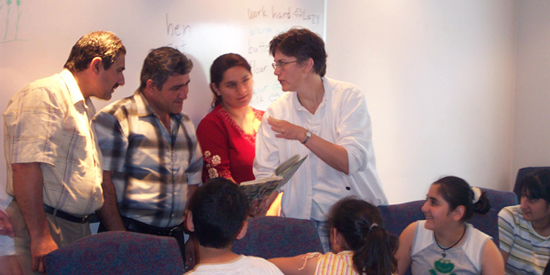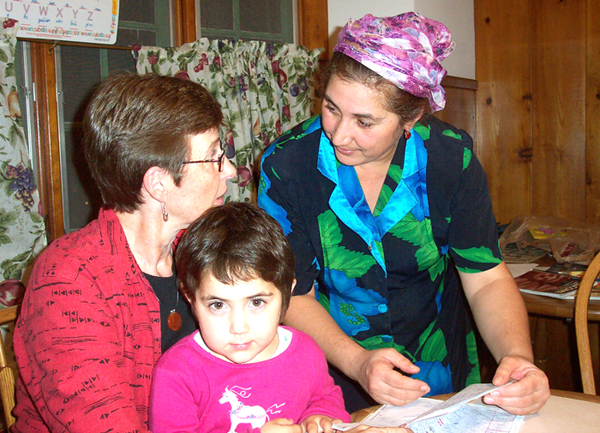Ivan & Martene Histand, Blooming Glen
marvanh@msn.com
Mennonite Church USA has roots in seventeenth-century churches planted by immigrants from Europe. Our church continues to grow and be enlivened by immigrants who join us from many countries. As Christians, we believe we are called to welcome these sojourners in our congregations and communities, especially as our government creates increasingly harsh immigration laws in the name of fighting terrorism……. (Statement on Immigration, July 2003)

Two years ago, Blooming Glen Mennonite Church was contacted by Lutheran Children and Family Services to help with assisting displaced Turkish families relocated from Russia into the Philadelphia area due to persecution. These were families originally from the what is now the Republic of Georgia who were forced to leave their
homeland in 1941 and resettle in Uzbekistan due to their ethnicity.
When the USSR crumbled in 1989, they once again were unwelcome and resettled in the Krasnodar region. Here persecution by the local Cossack authorities made life miserable and forced them to live in the shadows. It was a story that echoed that of Russian Mennonite immigrants.
Two families came to live in our community. One family has three daughters and the other has four (both fathers are brothers). Members of our congregation contributed time and resources to assist these “strangers†in acclimating into our community. There were housing and medical issues to deal with, jobs to be found, English to learn, and many opportunities to interact and learn. The adage “many hands make light work†was true as more than 50 persons in our congregation participated in the initial call for help.

Imagine fleeing a country where you were not welcome (even after living in it for 14 years) and coming to a country where the language is different from any of the three or four that you already speak. The alphabet is completely different and your religion is practiced by only a small minority of the people.
Though there was significant culture shock, both families were dedicated to succeed. English is not an easy language to learn and we initially communicated with a lot of smiles and hand gestures. We provided initial transportation for jobs, doctor visits, and other needs until some of the families were able to obtain driver’s licenses. The children adapted quickly to school and found new friends.
One Blooming Glen member recently had a joyous moment with Jamilya (one of the Turkish mothers) when she gave her a child’s book with a simple explanation of the Koran written in English. Jamilya had never seen the Koran in a language she could understand (it is usually written in Arabic). Although she read it faithfully, she never understood its meaning. Now she has a well worn English book that she treasures.
Watching these immigrant families interact is a source of joy. The love of family is something that we share across religious and cultural differences. The love they have for each other is heartwarming. They also accepted us as part of their family and placed their trust in us, even though we were as much “strangers†to them as they were to us when we met. We are more connected to strangers than we can imagine.
Recently Lutheran Children and Family Services hosted a meeting to hear how sponsoring organizations experienced the challenge of acclimating refugees into our communities. One of the challenges facing this organization is that there are more persons needing to be sponsored, but few churches who are willing to open themselves to this work. As persons shared, there was no doubt that resettlement required work.
Despite the difficulties and the sometimes unexpected levels of work involved, a common thread kept the ministry intact. The group had a clear sense they were doing the Lord’s work, that this is a ministry they were called to through the Spirit of God. We remember the words of Jesus, “I was a stranger and you took me in”
As if they were our own: An interview with Janet Panning (Plains), Program Director of Luthern Children and Family Services’ Refugee Resettlement Program
What challenges exist in recruiting congregations to work with refugees?
We are asking congregations to do the impossible – to love a family that has fled war and persecution, to love them into self-sufficiency in a very short period of time, and to love them enough to allow them to make choices that the congregation may find difficult, knowing that there is no guarantee that the love will be returned. The challenges of refugee resettlement are tremendous – housing, employment, transportation and so on – it takes many hands and much emotional energy for an intense period of time. We are asking for a lot.
In what ways would you like to challenge Franconia Conference congregations to host a family?
Iraqi refugees will be traveling to the US this fall. We may be asked to help up to 100 in the Philadelphia region. What will be their first impression of our country? Will they find a congregation and community welcome? Or will they find a continuation of prejudice and conflict? Every Franconia Conference congregation has an opportunity to make a difference.
What stories do you like to tell?
When I returned from Mennonite Central Committee in 1998 and began working at Luthern Children and Family Services, one of my first clients was a refugee woman who said “I have another daughter who is missing. When the soldiers came to our village in the night, we were chased out of our house and ran through the woods. I realized my 4-year old daughter was not with us and ran back to get her but all I found was her shoe. I found another baby next to the dead body of her mother and picked her up and ran with her. I love her as I love my own children. I pray to God that someone found my daughter and loves her the same way.â€
This story became for me a metaphor for what refugee resettlement is all about.We are asking churches to reach out and pick up that other mother’s child and love them as if they were their own. This particular family found their daughter 10 years after they lost her and she joined them in the US in 2004.
How to help
Both individual volunteers and larger church groups can become involved in this welcoming ministry. Refugees often arrive in this country with nothing more than a suitcase, and so your donations of beds, furniture, or other household goods are very much ppreciated. Congregations are needed to collect new items to make “Welcome Boxes†for refugee kitchens, bedrooms, bathrooms and school backpacks (see supply lists on blog). Volunteers are also needed to help with English tutoring, transportation to medical appointments, assistance locating employers, emergency housing and general cultural orientation. Individuals are also desperately needed to become foster parents for refugee children and for undocumented children awaiting deportation. For congregations interested in a deeper level of commitment, opportunities to sponsor a refugee family are also available.
Please call Lyn Back at 215-747-7500 x207, or visit www.lcfsrefugees.blogs.com, if you would like to find out more.
The opinions expressed in articles posted on Mosaic’s website are those of the author and may not reflect the official policy of Mosaic Conference. Mosaic is a large conference, crossing ethnicities, geographies, generations, theologies, and politics. Each person can only speak for themselves; no one can represent “the conference.” May God give us the grace to hear what the Spirit is speaking to us through people with whom we disagree and the humility and courage to love one another even when those disagreements can’t be bridged.
